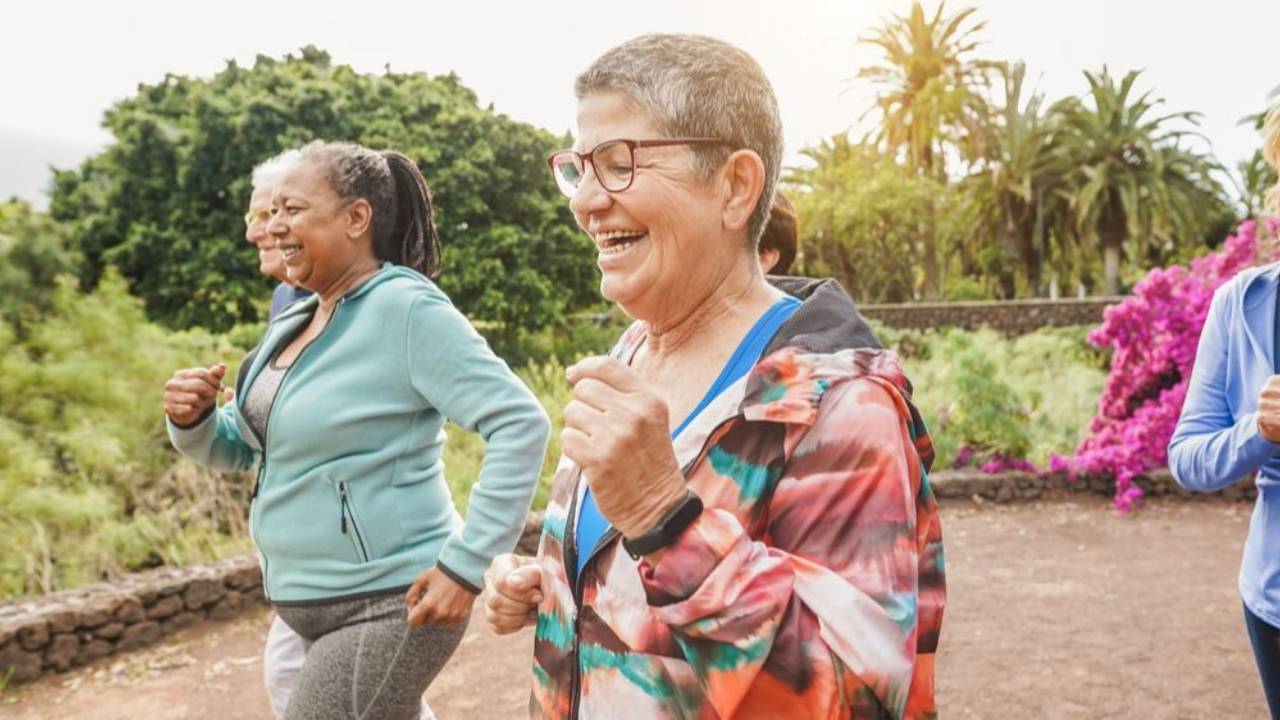Blog

For years, we’ve known that exercise improves fatigue, strength, and quality of life during and after cancer treatment. What we didn’t know, at least not at the highest scientific level, was whether movement could directly lower the risk of cancer coming back, or even help survivors live longer.
... Cancer doesn’t appear overnight. It’s the result of complex biological changes—many of which are shaped by the lives we lead each day. And among all modifiable risk factors, exercise stands out as one of the most powerful tools we have to prevent cancer before it starts, and to fight it if it does.
Cancer doesn’t appear overnight. It’s the result of complex biological changes—many of which are shaped by the lives we lead each day. And among all modifiable risk factors, exercise stands out as one of the most powerful tools we have to prevent cancer before it starts, and to fight it if it does.
 In a fitness world dominated by trends, templates, and 30-day transformation challenges, the promise of fast, one-size-fits-all results is tempting. But when it comes to long-term health, safety, and true transformation, cookie-cutter workouts don’t cut it. For most people, especially those with pre...
In a fitness world dominated by trends, templates, and 30-day transformation challenges, the promise of fast, one-size-fits-all results is tempting. But when it comes to long-term health, safety, and true transformation, cookie-cutter workouts don’t cut it. For most people, especially those with pre...
Watch this video to learn about the OncoVie™ Cancer Exercise Specialist training from the first guided session that is part of the Zoom Guided training program with business support. (Exclusively from the Cancer Exercise Training Institute (CETI)). You'll also get an introduction to cancer and the ...
Recent research in 2025 underscores the critical role of physical activity throughout the cancer journey—from diagnosis and treatment to survivorship. Despite growing evidence of its benefits, many cancer patients remain insufficiently active, potentially missing out on improved outcomes and quality...

Andrea Leonard
President, Founder CETI
Andrea is a 41-year cancer survivor. She has written 17 books on the subject of cancer and exercise, and developed the first version of the OncoVie™ Cancer Exercise Specialist course in 2004. The course is updated every 1-2 years and has trained over 18,000 specialists worldwide since 2004.
Categories
All Categories #cancerrecovery #cancersupport #mindbodyhealing #traumainformedcare #emotionalhealing #cancerwellness #healingaftercancer #survivorshipjourney #personalizedfitness #smarttraining #exercisescience #fitnessforlife #strongerbydesign #individualizedtraining #workoutwisdom #sustainablefitness #injuryprevention #customworkouts #functionaltraining #fitnesseducation #movementmatters #trainsmart #healthfirstfitness #evidencebasedfitness #nomorecookiecutter #exerciseismedicine #fitnesscoaching #safestrength #mindbodyhealth #fitnesspros #tailoredtraining #betterresults #smartworkouts #correctiveexercise #wellnessreboot #fitnessmotivation #movenourishthrive #holisticfitness 1980's ace ace certified ace personal trainer acsm acsm certified active treatment advanced cancer afaa afaa certified age's ai ai assistance alpelisib anti cancer diet anti-inflammatory diet ashkenazi jew attention defecit autoimmune conditions axillary node dissection axillary web syndrome basal cell basal cell carcinoma biomarkers bladder cancer survivor bladder control blader cancer blood cancer blood cancer awareness blood cancer awareness month bone cancer bone density brain fog brain health brca brca positive brca1 brca2 breast cancer breast cancer diagnosis breast cancer patient breast cancer prevention breast cancer prevention diet breast cancer recovery breast cancer recurrence breast cancer rehabilitation breast cancer surgeries breast cancer survivor breast cancer thriver breast cancer treatments breast cancer warrior breast cnacer survivor broad-spectrum sun screen cachexia cambria-1 cambria-2 camizestrant cancer cancer acceptance cancer awareness month cancer cachexia cancer caregiver cancer causing cancer coach cancer community cancer comorbidities cancer diagnosis cancer exercise cancer exercise guidelines cancer exercise specialist cancer exercise trainer cancer exercise training institute cancer fatigue cancer fatigure cancer fear cancer nutrition cancer patient cancer patients cancer prevention cancer prevention diet cancer recovery cancer recurrence cancer rehab cancer rehabilitation cancer related fatigue cancer risk cancer survivor cancer survivors cancer survivorship cancer thriver cancer treatment cancer treatment side-effects cancer treatments with exercise cancer-fighting foods cancer-related cognitive impairment canfipro canfit canfitpro canfitpro certified caregiver carer casein cdki cdt celiac celiac disease ces cet ceti challenge trial chatgpt chemo chemo-induced neuropathy chemobrain chemotherapy chemotherapy side effects childhood cancer childhood cancer awareness childhood cancer awareness month chrohn's disease cimspa climate change clt cly cnacer prevention cognition cognitive decline cognitive function cognitive health cognitive impairment cognitive interventions cognitive stimulation colon colon cancer colon cancer awareness colon cancer patient colon cancer prevention colon cancer survivor colorectal cancer colorectal cancer awareness colorectal cancer awareness month complete decongestive therapy compression compression bandages compression bandaging compression garments cording crc ctdna cure sarcoma cytokines daily exercise daily steps daily walking dairy-free daitr dementia depression depression management depression prevention diabetes diabetes prevention diet dietary guidance dietician dietray guidance difficulty concentratiing disease prevention disease prevention diet dpt dysuria elacestrant end of life energy er antagonist er postive ereps erpr postive ewing sarcoma ewings sarcoma executive function exercise exercise benefits exercise is medicine exercise matters exercise oncology exercises fap fckcancer fear of death fear of dying fitness fitness business fitness certifications fitness continuing education fitness education fitness for survivors fitness industry frequent urination fuckcancer genetic mutations genetic testing genome genomics gentic mutation genx git microbiome gluten gluten intolerance gluten sesitvity gluten-free hairloss healing journey health after cancer health care team healthy diet heart disease her2 hodgkins hodgkins lymphoma hormonal therapy hospice hospice care idea health and fitness igf-1 immunity immunocompromization immunotherapy improved sleep inactivity inflammation inflammatory response insulin resistance issa issa certified issa certified personal trainer jennifer golden junk food lactose late-stage cancer leaky gut leiomyosarcoma lethargy leuemia leukemia leukemia awareness life expectancy liposarcoma liquid biopsy lmt lumpectomy lympedema management lymph lymph drainage lymphangiosarcoma lymphatic drainage lymphatic massage lymphatic system lymphedema lymphedema prevention lymphoma mask medfit medical fitness meditation melanoma melanoma prevention memory loss memory lpases menopause mental fatigue mental fog merkel cell carcinoma metabolic disorders metastatic cancer migraines moevement is medicine moh's micrographic moles mood disorders morbidity multiple myeloma myeloma awareness nasm nasm certified nasm personal trainer nesta nesta certified neuropathy neuropathy management ngs panel test nivolumab non hodgkins lymphoma non-melanoma skin cancer nsca nsca certified nsca certified personal trainer nutrition nutrition after cancer treatment nutrition during cancer treatment nutrition guidance nutrition intervention nutritionist nutrititionist obsity occupational therapist occupational therapy on death and dying oncology care oncology exercise oncology nutrition oncovie oncovie cancer exercise specialist osteoporosis osteoporosis prevention osteosarcoma oxidative stress ozone depletion pain pain management patient navigator pediatric cancer pelvic floor pelvic floor exercises pelvic floor muscle training pelvic floor physical therapy peripheral neuropathy personal trainers physical education physical therapist physical therapy physical therpy continuing education physiotherapist physiotherapy pik3ca pilates instructor pilates instructor training positive mindset processed foods prostate cancer prostate cancer prevention prostate cancer survivor pt qigong radiation therapy registered dietician reiki rheumatoid arthritis ryan glatt sarcoma sarcoma awareness sarcoma awareness month sarcoma community sarcoma strong sarcoma survivor sarcoma warrior sedentary lifestyle sedentary lifstyle skin skin cancer skin cancer awareness month skin cancer prevention skin cancer prevention ideas skin care squamous cell squamous cell carcinoma stage 4 stage four stage four cancer steps steps for health steps per day stress stress management sugar sugar dependence sugar-free sun sun damage sunblock sunburn sunscreen suntan survivor strong survivorship matters synovial sarcoma systemic inflammation tan tanning tanning bed tanning beds tanning industry ten thousand steps terminal cancer treatment efficacy treatment side effects triple negative turcot syndrome type 2 diabetes type two urinary incontinence urination urgency uv exposure uv index uv protection uv rays w.i.t.s. walk for health walking walking for life walking is medicine weight loss well-being wellness world instructor training school yellow for sarcoma yoga instructor yoga instructor training



